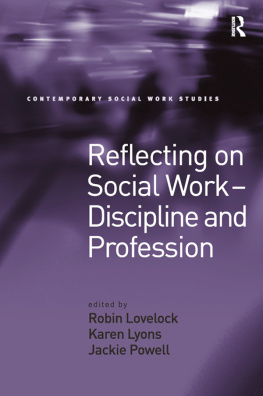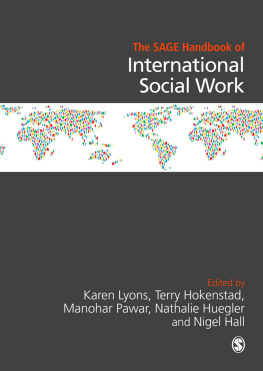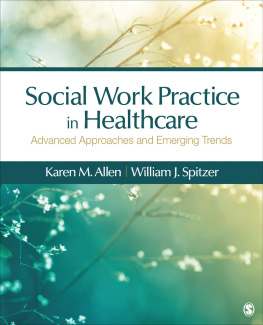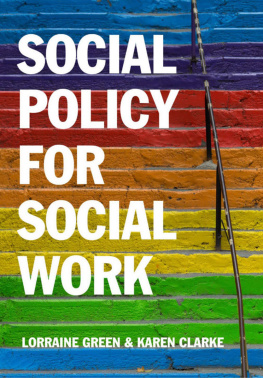SOCIAL WORK IN HIGHER EDUCATION
Already published in this series, in association with CEDR
(Series Editor Robin Lovelock)
Changing Patterns of Mental Health Care A case study in the development of local services Jackie Powell and Robin Lovelock
Partnership in Practice The Children Act 1989 ed. Ann Buchanan
Disability: Britain in Europe An evaluation of UK participation in the HELIOS programme (1988-1991)
Robin Lovelock and Jackie Powell
The Probation Service and Information TechnologyDavid Colombi
Visual Impairment; Social Support Recent research in context Robin Lovelock
Workloads: Measurement and ManagementJoan Orme
Living with Disfigurement Psychosocial implications of being born with a cleft lip and palate Poppy Nash
Educating for Social Work: Arguments for Optimism
eds Peter Ford and Patrick Hayes
Dementia Care: Keeping Intact and in Touch A search for occupational therapy interventions M. Catherine Conwy
Suicidal Behaviour in Adolescents and Adults Research, taxonomy and prevention Christopher Bagley and Richard Ramsay
Narrative Identity and Dementia A study of autobiographical memories and emotions Marie A. Mills
Child Sexual Abuse and Adult Offenders: New Theory and Researcheds Christopher Bagley and Kanka Mallick
Community Approaches to Child Welfare International perspectives ed. Lena Dominelli
In preparation
Valuing the Field Child welfare in an international context ed. Marilyn Callahan
Parents in Need Reflecting on social work assessment where both child care and parental mental ill-health are involved Sue Beresford
First published 1999 by Ashgate Publishing
Reissued 2018 by Routledge
2 Park Square, Milton Park, Abingdon, Oxon, OX14 4RN
711 Third Avenue, New York, NY 10017, USA
Routledge is an imprint of the Taylor & Francis Group, an informa business
Copyright Karen Lyons 1999
All rights reserved. No part of this book may be reprinted or reproduced or utilised in any form or by any electronic, mechanical, or other means, now known or hereafter invented, including photocopying and recording, or in any information storage or retrieval system, without permission in writing from the publishers.
Notice:
Product or corporate names may be trademarks or registered trademarks, and are used only for identification and explanation without intent to infringe.
Publishers Note
The publisher has gone to great lengths to ensure the quality of this reprint but points out that some imperfections in the original copies may be apparent.
Disclaimer
The publisher has made every effort to trace copyright holders and welcomes correspondence from those they have been unable to contact.
A Library of Congress record exists under LC control number: 99076358
ISBN 13: 978-1-138-34552-2 (hbk)
ISBN 13: 978-1-138-34554-6 (pbk)
ISBN 13: 978-0-429-43783-0 (ebk)
Sonia Jackson
How do we account for the precarious foothold of social work in British universities? Apart from a brief period in the 1970s when the workforce requirements of the newly established social services departments seemed to guarantee the future of social work education, the subject has faced a constant struggle to survive as an academic discipline. Yet Schools of Social Work are springing up all over Eastern Europe, while in the United States, where over three thousand social work educators regularly gather for their annual conference, social work academics occupy grand buildings and have access to the levers of power.
One of the main characteristics of social work education in the United Kingdom is its inward-looking quality, and probably the majority of social work teachers are barely aware of the contrast between their position and that of the continental and North American colleagues. They are too enmeshed in the endless negotiations and meetings which take up so much of their energy and have severely limited their capacity to compete with colleagues in less applied subjects when it comes to research ratings and lists of publications. This is the first book, based on thorough research and empirical evidence, to look at the current state of social work in higher education both from an historical and an international perspective.
Even twenty years ago, British social work was in a position to provide a model for the world. In most countries social work students were still taught by academics from other disciplines, with an add-on of social work theory and methods, and fieldwork placements having little relation to the theoretical component. In this country, the idea of an integrated course explicitly designed for the learning needs of future social workers was well advanced. In addition, the social work profession had developed ideas about combating racism and discrimination through training long before it became fashionable, and the idea that practice should be informed by research rather than intuition was making a real headway.
So what happened to create the present situation, where statutory social work is increasingly downgraded to a bureaucratic exercise involving minimal engagement with people, there is a chronic shortage of high quality research directly concerned with social work theory and methods, and the very existence of social work as a university discipline is under threat?
Karen Lyons has done a most valuable service by unravelling the strands that contribute to this sorry state of affairs and tracing their antecedents. She sets the problems of academic social work within the wider context of higher education generally, as well as noting that other professions too have been under attack in recent years. Social work, however, suffered uniquely from a hostile climate in the media as well as in Westminster. The most significant blow was Margaret Thatchers highly predictable refusal to fund a three-year programme, followed by CCETSWs attempt to save face by fudging the non-graduate/postgraduate issue. If the qualification for social work is set at sub-degree why should the taxpayer subsidise expensive degree courses, still less postgraduate study? Postqualifying education too has been blighted by the confusing and illogical structure imposed on it.
In all this, the Central Council, with its increasingly symbiotic relationship with central government, emerges as the villain of the piece. The social work teachers surveyed by Karen Lyons are in agreement that the onerous requirements laid down by CCETSW for formal partnership structures in place of pre-existing collaborations based on different though complementary functions, have been immensely time-consuming and produced little benefit to students or the profession. They are also costly, making social work an unpopular subject with university administrations.
However, one of the authors most striking findings is the invisibility of social work within higher education. In two out of three institutions social work is subsumed within departments whose title does not even indicate its existence. Moreover, social work academics rarely occupy influential positions in the governance of universities and this makes the subject a highly vulnerable target in times of financial stringency.








